Serving 490 students in grades Prekindergarten-5, P.s. 68 ranks in the bottom 50% of all schools in New York for overall test scores (math proficiency is bottom 50%, and reading proficiency is bottom 50%).
The percentage of students achieving proficiency in math is 41% (which is lower than the New York state average of 46%). The percentage of students achieving proficiency in reading/language arts is 49% (which is equal to the New York state average of 49%).
The student:teacher ratio of 9:1 is lower than the New York state level of 11:1.
Minority enrollment is 97% of the student body (majority Black), which is higher than the New York state average of 60% (majority Hispanic and Black).
Quick Stats (2025)
- Grades: Prekindergarten-5
- Enrollment: 490 students
- Student:Teacher Ratio: 9:1
- Minority Enrollment: 97%
- Overall Testing Rank: Bottom 50% in NY
- Math Proficiency: 41% (Btm 50%)
- Reading Proficiency: 49% (Top 50%)
- Science Proficiency: 85-89% (Top 50%)
- Source: National Center for Education Statistics (NCES), NY Dept. of Education
Top Rankings
P.s. 68 ranks among the top 20% of public schools in New York for:
Category
Attribute
Student Attention
School Overview
P.s. 68's student population of 490 students has declined by 23% over five school years.
The teacher population of 55 teachers has declined by 20% over five school years.
Grades Offered
Grades Prekindergarten-5
(offers virtual instruction)
(offers virtual instruction)
Total Students
490 students
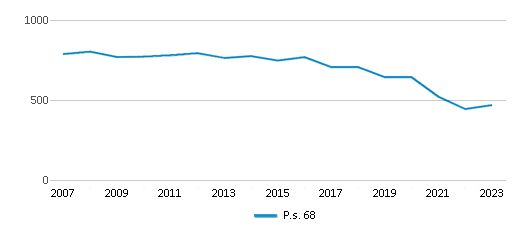
Gender %
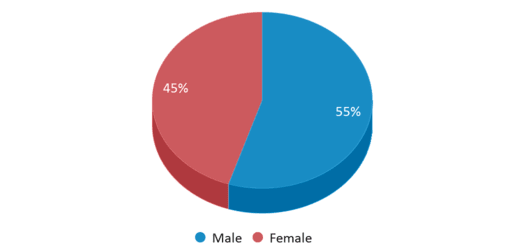
Total Classroom Teachers
55 teachers
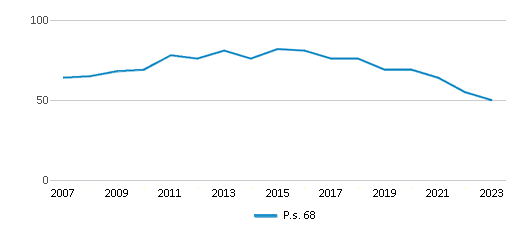
Students by Grade
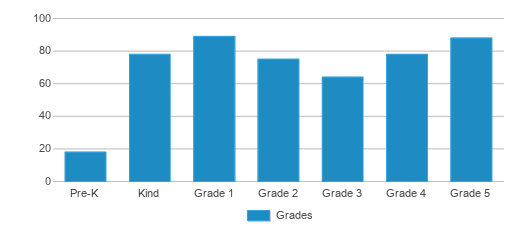
School Rankings
P.s. 68 ranks within the bottom 50% of all 4,377 schools in New York (based off of combined math and reading proficiency testing data).
The diversity score of P.s. 68 is 0.51, which is less than the diversity score at state average of 0.72. The school's diversity has stayed relatively flat over five school years.
Overall Testing Rank
#2336 out of 4377 schools
(Bottom 50%)
(Bottom 50%)
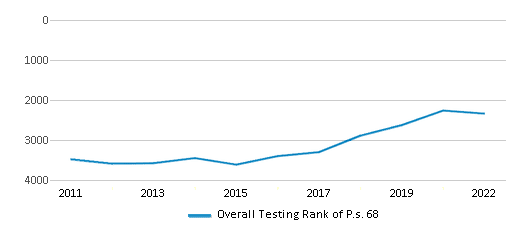
Math Test Scores (% Proficient)
41%
46%
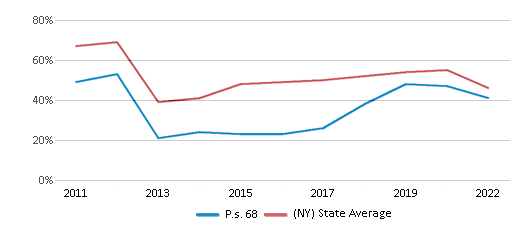
Reading/Language Arts Test Scores (% Proficient)
49%
49%
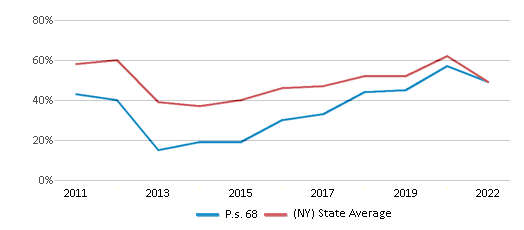
Science Test Scores (% Proficient)
85-89%
78%
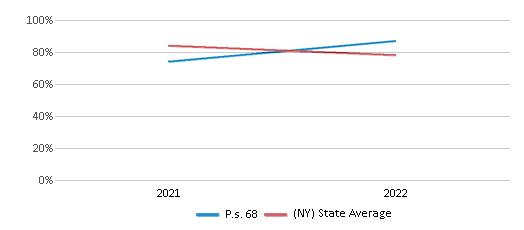
Student : Teacher Ratio
9:1
11:1
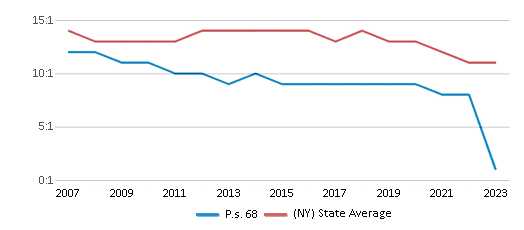
American Indian
1%
1%
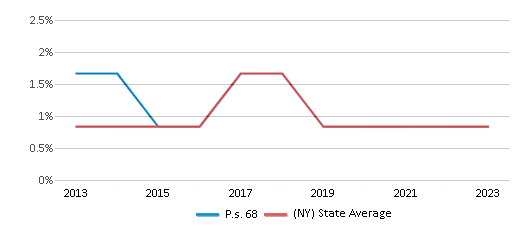
Asian
1%
10%
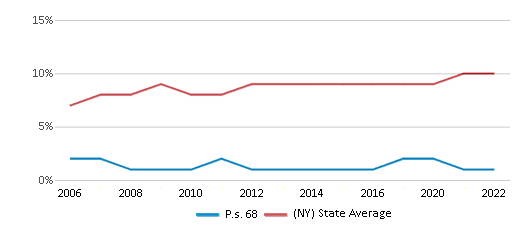
Hispanic
29%
30%
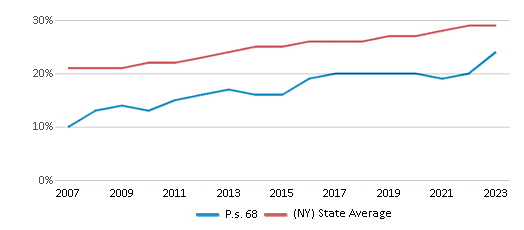
Black
64%
16%
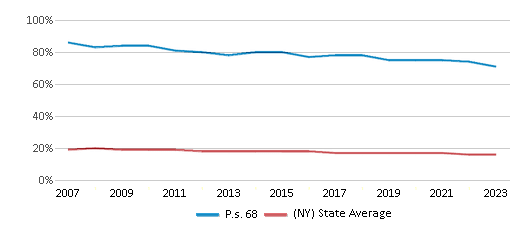
White
3%
40%
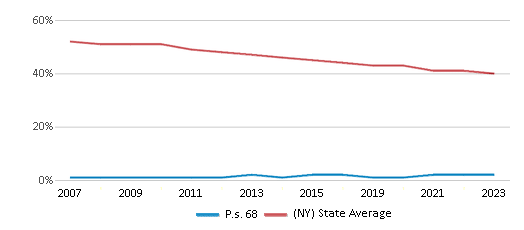
Hawaiian
n/a
n/a
Two or more races
2%
3%
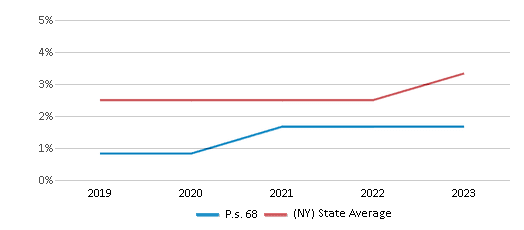
All Ethnic Groups
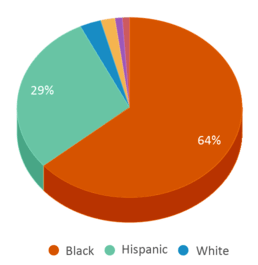
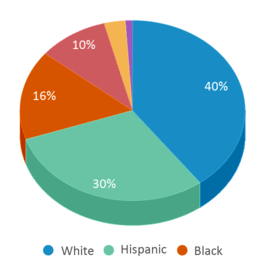
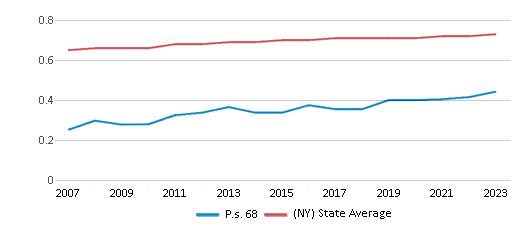
Participates in the National School Lunch Program (NSLP)
Yes
Eligible for Free Lunch
78%
54%
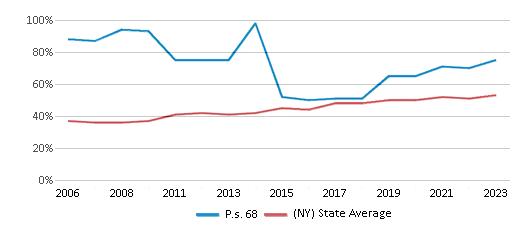
Eligible for Reduced Lunch
1%
3%
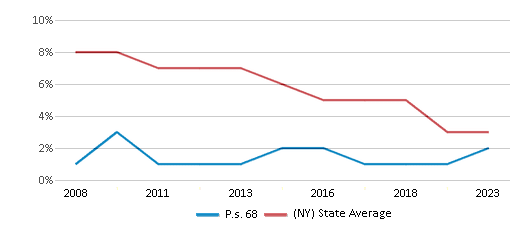
School Statewide Testing
School District Name
Source: National Center for Education Statistics (NCES), NY Dept. of Education
Profile last updated: 02/09/2025
Frequently Asked Questions
What is P.s. 68's ranking?
P.s. 68 is ranked #2336 out of 4,377 schools, which ranks it among the bottom 50% of public schools in New York.
What percent of students have achieved state testing proficiency in math and reading?
41% of students have achieved math proficiency (compared to the 46% NY state average), while 49% of students have achieved reading proficiency (compared to the 49% NY state average).
How many students attend P.s. 68?
490 students attend P.s. 68.
What is the racial composition of the student body?
64% of P.s. 68 students are Black, 29% of students are Hispanic, 3% of students are White, 2% of students are Two or more races, 1% of students are American Indian, and 1% of students are Asian.
What is the student:teacher ratio of P.s. 68?
P.s. 68 has a student ration of 9:1, which is lower than the New York state average of 11:1.
What grades does P.s. 68 offer ?
P.s. 68 offers enrollment in grades Prekindergarten-5 (offers virtual instruction).
What school district is P.s. 68 part of?
P.s. 68 is part of New York City Geographic District #11 School District.
In what neighborhood is P.s. 68 located?
P.s. 68 is located in the Edenwald neighborhood of Bronx, NY. There are 7 other public schools located in Edenwald.
School Reviews
4 3/23/2019
The new principal, Ms. Solis, has done a phenomenal job in improving the school. She is very hand-on/involved, actively engaged with parents & staff alike, created more programs & activitivies for the kids and has a great leadership quality.My child is currently in third grade. He has been there since kindergarten. I never seen the previous principal actively involved or meet and greet the parents. For the teachers, all is great but Ms Gutierrez has been the Best second grade teacher. She has the same qualities as Ms Solis. My child often talks about her. Her class motivates him to do well in school until this day.
5 9/9/2017
So far so good. My child likes the school. Staff seems to be pretty good. Running a school is a hard job we should appreciate the hard work that goes into being an educator. AP Mr Vail is a grest guy very much involved. I'll return with a review in 6months
4 5/13/2017
Our new principle is amazing there are so many clubs and the school is getting better each day. Also I am in fifth grade
5 7/4/2014
I went to that school from 3rd grade to 5th grade and I loved it. The teachers was great and I loved every year at that school. I took the bus to that school for 3 years. Now I'm sending my son there. I'm really hoping I can see my old teachers when I drop my son off. GREAT MEMORIES
Review P.s. 68. Reviews should be a few sentences in length. Please include any comments on:
- Quality of academic programs, teachers, and facilities
- Availability of music, art, sports and other extracurricular activities
Recent Articles

What Is A Charter School?
Explore the world of charter schools in this comprehensive guide. Learn about their history, how they operate, and the pros and cons of this educational innovation. Discover key facts about charter schools, including admission policies, demographics, and funding, as well as what to look for when considering a charter school for your child.

10 Reasons Why High School Sports Benefit Students
Discover the 10 compelling reasons why high school sports are beneficial for students. This comprehensive article explores how athletics enhance academic performance, foster personal growth, and develop crucial life skills. From improved fitness and time management to leadership development and community representation, learn why participating in high school sports can be a game-changer for students' overall success and well-being.

February 05, 2025
Understanding the U.S. Department of Education: Structure, Impact, and EvolutionWe explore how the Department of Education shapes American education, from its cabinet-level leadership to its impact on millions of students, written for general audiences seeking clarity on this vital institution.









